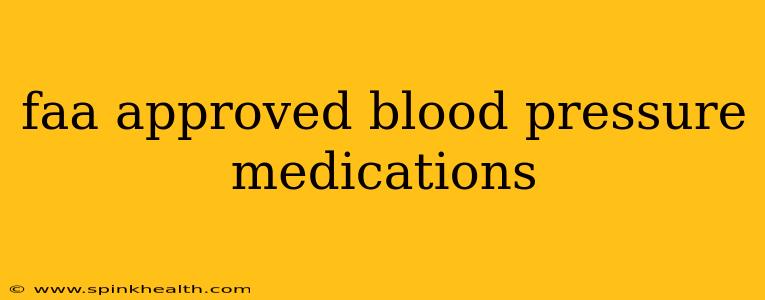The hum of the airplane engine, the anticipation of travel – these are joys many experience. But for those managing hypertension, air travel can bring added concerns. The question often arises: Which blood pressure medications are FAA approved for pilots and aircrew? The answer isn't a simple list, but rather a nuanced understanding of the interaction between medication, individual health, and aviation safety. This post explores the complexities of blood pressure management and air travel, providing clarity and insight.
My name is Dr. Evelyn Reed, and I've spent over 20 years working with aviation professionals who manage hypertension. I understand the unique challenges they face, balancing their passion for flight with the need for effective health management. This isn't just about a list of medications; it's about understanding the process and implications.
What Makes a Blood Pressure Medication "FAA Approved"?
There's no official "FAA-approved" list of blood pressure medications. The Federal Aviation Administration (FAA) doesn't endorse specific drugs. Instead, the focus is on airworthiness, meaning a pilot or aircrew member must be deemed medically fit to safely perform their duties. This determination is based on a comprehensive medical evaluation, considering several factors including:
- The specific medication: Certain medications can cause side effects like drowsiness, dizziness, or impaired cognitive function—all significant safety concerns at altitude.
- The individual's response to the medication: Even with a medication generally considered safe, an individual's reaction can vary. Regular monitoring and open communication with a physician are crucial.
- The severity of the hypertension: Well-controlled hypertension is significantly less of a risk than uncontrolled hypertension. Consistent management is key.
The process involves a thorough medical examination by an Aviation Medical Examiner (AME). The AME reviews the pilot's medical history, current medications, and test results to assess their fitness for flight. This is a crucial step.
What Blood Pressure Medications are Commonly Used by Pilots?
While there's no official list, certain medications are generally well-tolerated and less likely to cause side effects that interfere with flight. These typically fall into categories such as:
- ACE inhibitors: These are often a first-line choice for many, but their potential side effects need careful monitoring.
- Angiotensin receptor blockers (ARBs): Similar to ACE inhibitors, they offer effective blood pressure control.
- Beta-blockers: These can help manage blood pressure and are sometimes prescribed, but their potential to cause fatigue is something to be mindful of.
- Calcium channel blockers: These are another common choice, but potential side effects like dizziness need careful consideration.
- Diuretics: Often used in combination with other medications, they help manage fluid retention.
This isn't an exhaustive list, and the choice of medication is highly individualized. The best approach is always a collaborative one between the pilot, their physician, and the AME.
How Can I Discuss Blood Pressure Medication with My AME?
Open and honest communication is vital. Before your medical examination, thoroughly document:
- All medications you're taking: Including dosages and frequency.
- Any side effects you've experienced: Even seemingly minor side effects should be reported.
- The results of your recent blood pressure monitoring: Consistent readings provide crucial context.
- Any other health concerns: These may influence medication choices and fitness determination.
Your AME will review this information and consider your overall health status to determine your medical fitness for flight.
Can I Fly If I Have Uncontrolled Hypertension?
No. Uncontrolled hypertension poses significant health risks, including the potential for stroke or heart attack—extremely dangerous situations in the cockpit. It’s crucial to achieve well-managed blood pressure before considering air travel, particularly as a pilot or aircrew member.
What are the Potential Side Effects of Blood Pressure Medication That Affect Flying?
Several side effects can impact flight safety. These include:
- Drowsiness or fatigue: This can severely impair judgment and reaction time.
- Dizziness or lightheadedness: This can be incredibly dangerous, especially during takeoff and landing.
- Visual disturbances: Blurred vision or other visual problems can significantly compromise flight safety.
These are just some of the potential side effects. The key is to work with your doctor to find the medication and dosage that effectively manages your hypertension while minimizing these risks.
Conclusion: A Collaborative Approach to Safety
Managing hypertension while pursuing a career in aviation requires a proactive, collaborative approach. Open communication with your physician, careful monitoring of your health, and a thorough understanding of the aviation medical certification process are essential. Remember, your safety, and the safety of your passengers, are paramount. This isn't just about finding an "FAA-approved" medication; it's about achieving optimal health and airworthiness.

